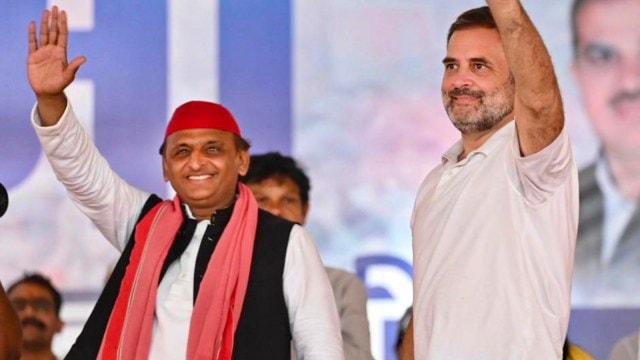
Social justice politics that found a lively presence during the 1990s era of the Mandal Commission was seen, until recently, as being in premature decline. As the BJP gained electoral strength in 2014, the political and electoral presence of parties such as the BSP, RJD, and SP, which flourished in the light of the Mandal Commission agitation and subaltern politics, shrank significantly. For example, in the most recent Uttar Pradesh legislative assembly elections in 2022, the BJP and its allies’ vote share was 43.8 per cent. SP’s vote share rose beyond 30 per cent for the first time in its history. With its allies, it got 36.32 per cent of the votes polled. The Congress and BSP suffered the most. The BSP’s vote share in UP drastically declined to 12.88 per cent from a peak of 30.43 per cent in the 2007 UP election.
Does the SP, with its key INDIA-bloc partner Congress, stand to gain not just an enlarged vote share but also parliamentary seats in the ongoing general election? While the answer will only emerge on June 4, the crowds drawn by Akhilesh Yadav and Rahul Gandhi in recent rallies are unprecedented and do point towards a central narrative of what I call “subaltern justice”.
The INDIA bloc has steered the pitch of the ongoing election to the politics of social justice and development— centred around the arc of subaltern justice, not necessarily subaltern secularism. The momentum built in the autumn of 2023 with the formation of the INDIA bloc was subdued by the winter as Congress shifted its attention to elections in Madhya Pradesh, Rajasthan, and Chhattisgarh. It overlooked INDIA meetings and the alliance itself.
Meanwhile, the BJP not only consolidated its ideological support by inaugurating the Ram Mandir but also strengthened its narrative of development around “labharthis” (beneficiaries of the government’s welfare policies) as it won the elections in Rajasthan, MP, and Chhattisgarh. The narrative of the INDIA bloc was incoherent throughout the winter season, and internal strife remained in the news. However, from January onwards, INDIA has been gathering steam in UP under the dual leadership of Akhilesh Yadav and Rahul Gandhi.
Their narrative is structured around ideas of social as well as economic injustice. It includes those who have been pushed out from the allocation of resources and policies, those who have suffered historical social discrimination, and those who have been excluded as beneficiaries of current welfare policies. The Constitution has been mobilised as a symbol of this subaltern justice politics. Rahul Gandhi’s call for “jitni abadi, utna haq” (distribution of public resources proportionate to the population) coupled with various opposition parties’ (SP, RJD, and Congress) collective demand for a caste census has brought back the question of social justice and redistribution of public resources to the forefront of Indian politics. The SP’s ability to carve out an election strategy out of this fluid demand is what will be tested in the polls, as with the RJD in Bihar.
Akhilesh Yadav’s PDA strategy — standing for the welfare of Pichhade (backwards), Dalits, Alpsankhyak (minorities) and Adhi Abadi (women) — may be the key to wooing voters beyond the SP’s core support base of Yadavs and Muslims. A direct implication of this strategy can be seen in the selection of SP candidates. They have given tickets to many non-Yadav OBCs and are fielding Dalit candidates for non-reserved seats. Such a move is strategic considering the declining voter base of the BSP. What is even more interesting is that the PDA strategy has come out as a socio-economic issue-based one rather than a mere reassembling of caste leaders.
In the run-up to the elections, news and social media were dominated by stories of youths’ frustration over paper leaks and the resulting lack of employment, government employees’ desire for a better pension scheme, and farmers’ seeking greater MSP. Akhilesh Yadav in his speeches and interviews has reached out to youths, farmers, government employees, and women. He has been trying to mobilise votes around what he believes is the ill-thought-out Agnipath scheme; fears associated with the vaccine; the potential erosion of constitutional provisions such as reservation (jaan aur samvindhan), and the lack of quality rations and internet facilities (Anna aur data). If one looks closely at his speeches, it seems he has adopted a pedagogic style of educating the masses with the aim of turning assumed dissatisfaction against the BJP into votes. Many of these issues had been rehearsed during the pre-election Lok Jagran Yatra, the Cycle Yatra, and the Ghosi by-poll elections (which SP won by huge margins).
Alongside Akhilesh, Rahul Gandhi has also echoed similar concepts of subaltern justice, which could be seen as an improvised strategy emerging from the experience of the Nyay Yatra (justice march). It emphasises issues of equitable justice for both the economic poor and the social poor. A nationwide socio-economic and caste census is in the Congress manifesto to survey class and caste inequities, along with a proposal for increasing the reservation cap for SCs, STs, and OBCs beyond 50 per cent. These are bold measures even for Congress.
Several issues have come together to give air to the idea of subaltern justice, mainly the lack of employment among the younger population and inflation. Both the Congress and SP tried to present the Agnipath scheme as denying the aspirations of youths seeking security and a permanent income. They have also promised marginalised social groups a share in private job opportunities and the filling of current empty general and reserved vacancies in public institutions. Thus, what we are witnessing is a mixing of economic concerns (unemployment) with social ones (reservation), leading to subaltern justice, which encompasses both.
The writer is a historian based at the University of Nottingham, UK
© The Indian Express Pvt Ltd
First uploaded on: 28-05-2024 at 13:58 IST


